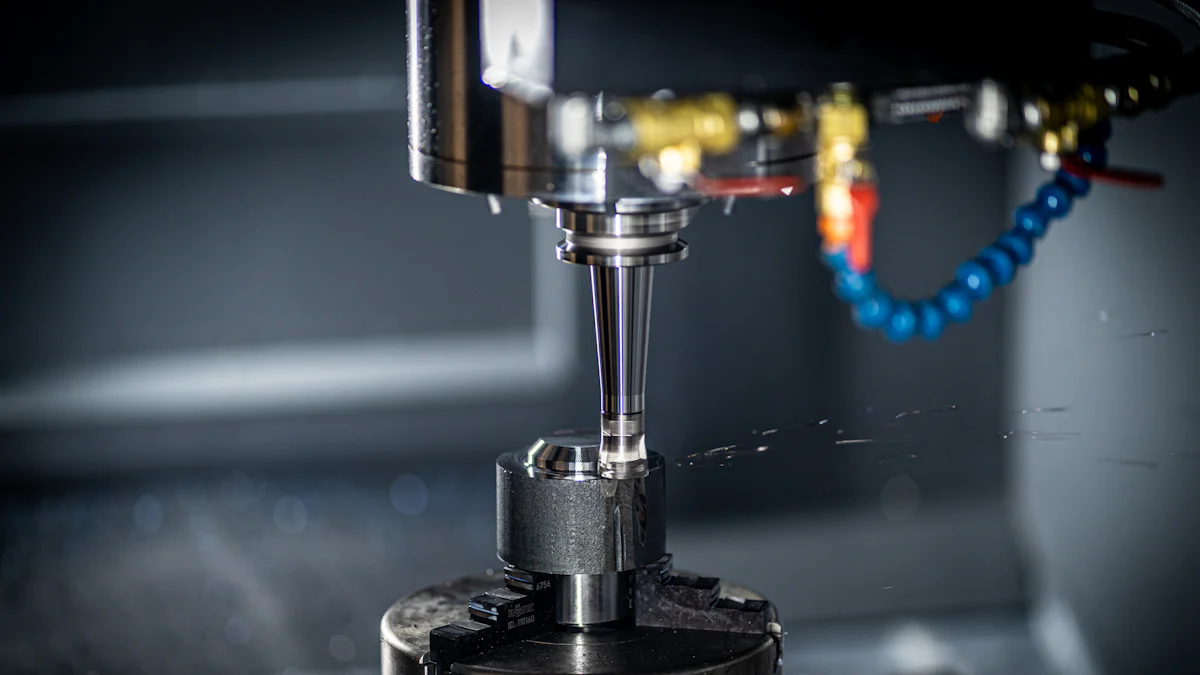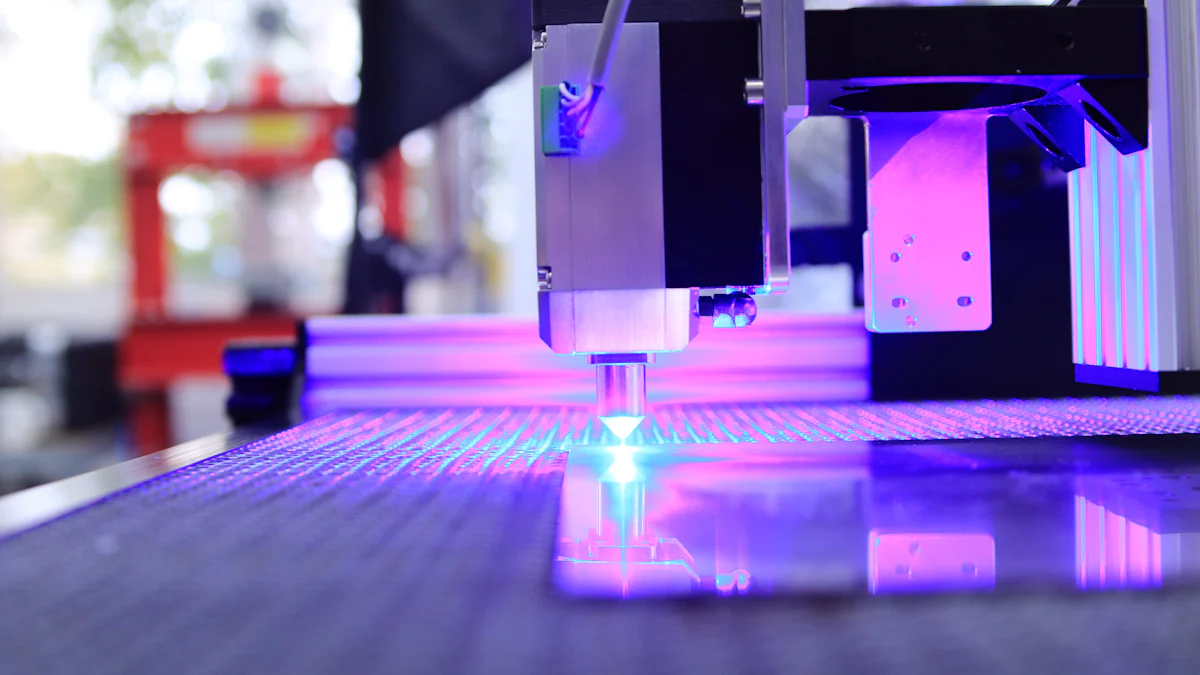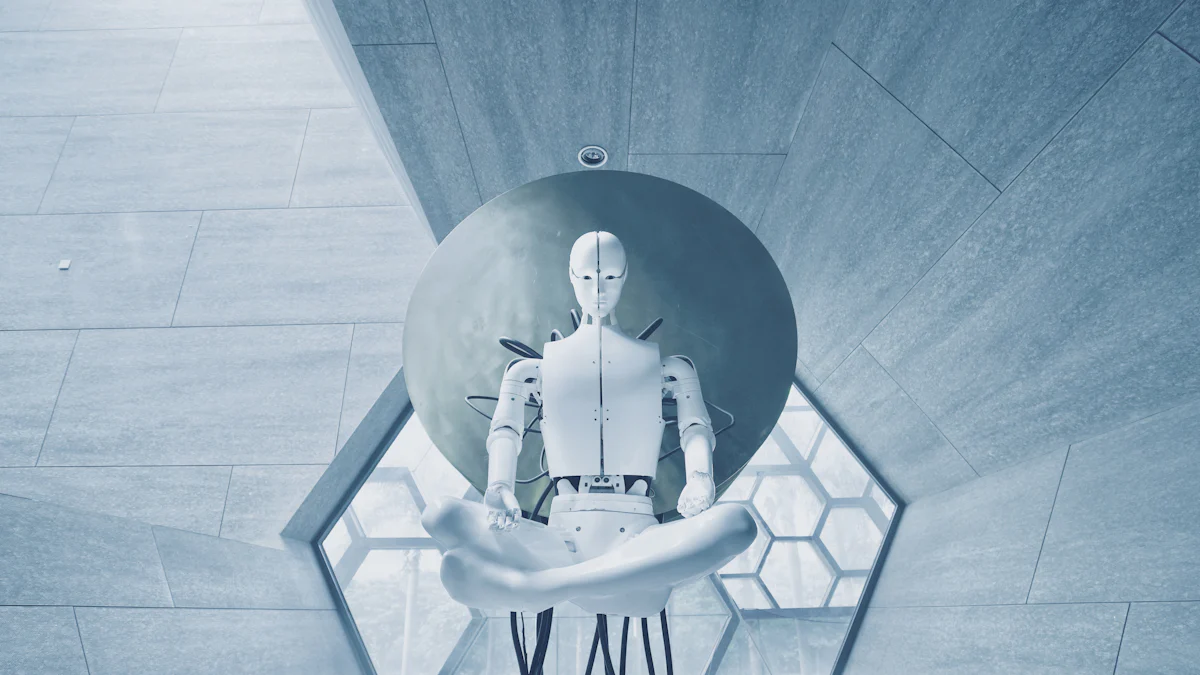The Future of Manufacturing: CNC Machining Centres

CNC Machining Centres play a pivotal role in modern manufacturing, offering unparalleled precision and efficiency. The global market size for CNC Machining Centres is projected to grow significantly, reaching US$ 17380 million by 2032 with a CAGR of 5%. Industry experts emphasize the transformative impact of CNC machining on production capabilities, driving growth amidst labor challenges. As technology advances, these centers continue to evolve, meeting the demand for high-quality standards and faster production rates.
Technological Advancements

Machining Centers are at the forefront of technological advancements, revolutionizing manufacturing processes across various industries. These centers offer exceptional versatility and precision, catering to a wide spectrum of applications. Their automation capabilities contribute significantly to enhanced operational efficiency, making them equally adept for high-volume production and customized, intricate components.
Automation
Automatic Tool Changers
One of the key features enhancing efficiency in CNC Machining Centres is the implementation of Automatic Tool Changers. This innovation allows for seamless tool transitions during operations, minimizing downtime and maximizing productivity. The ability to automatically swap tools based on programmed instructions streamlines the machining process, ensuring continuous workflow without manual intervention.
Unattended Operation
Another remarkable advancement in CNC Machining Centres is the concept of Unattended Operation. By leveraging automation technologies, these centers can operate autonomously for extended periods. This capability not only boosts productivity but also enhances safety by reducing human intervention in potentially hazardous machining environments. Manufacturers benefit from increased output while maintaining consistent quality standards.
Precision and Accuracy
Advanced Control Systems
The integration of state-of-the-art Advanced Control Systems has elevated the precision levels of CNC machining to unprecedented heights. These systems enable real-time monitoring and adjustment of machining parameters, ensuring optimal performance throughout the production cycle. Manufacturers can achieve intricate geometries and tight tolerances with utmost accuracy, meeting the stringent requirements of modern industrial applications.
High-Speed Machining
In response to market demands for faster turnaround times, CNC Machining Centres have embraced High-Speed Machining capabilities. By optimizing cutting strategies and toolpath algorithms, these centers can achieve accelerated processing speeds without compromising surface finish or part quality. High-speed machining not only enhances productivity but also reduces lead times, enabling manufacturers to meet tight deadlines effectively.
CNC Machining Centres
Horizontal and Vertical Configurations
The versatility of CNC Machining Centres is exemplified through their diverse configurations, including both Horizontal and Vertical setups. Horizontal configurations are ideal for heavy-duty machining tasks and large workpieces, offering stability and rigidity during operation. On the other hand, vertical setups excel in multi-sided machining operations and are well-suited for applications requiring intricate detailing and complex geometries.
Multi-Axis Capabilities
Modern CNC Machining Centres boast advanced Multi-Axis Capabilities, allowing for simultaneous movement along multiple axes during machining operations. This dynamic functionality enables complex part production with minimal setup changes, enhancing overall efficiency and accuracy. Manufacturers can achieve intricate designs and contours with ease, expanding the scope of possibilities in precision manufacturing.
Industry Applications
Automotive Industry
Machining centers play a crucial role in the automotive industry, particularly in the production of engine components. These precision machines are instrumental in crafting intricate parts with utmost accuracy and consistency. The use of CNC machining centers ensures that engine components meet stringent quality standards, enhancing overall performance and durability.
In addition to engine components, machining centers are also extensively utilized in manufacturing transmission systems for vehicles. The advanced automation capabilities of CNC machining centers enable the seamless production of complex transmission parts, ensuring optimal functionality and efficiency. By leveraging these cutting-edge technologies, automotive manufacturers can streamline their production processes and deliver high-quality transmission systems to meet market demands.
Aerospace Industry
Within the aerospace sector, machining centers are indispensable for producing structural components that form the foundation of aircraft and spacecraft. These critical parts require exceptional precision and reliability, qualities that CNC machining centers excel at providing. By harnessing the power of advanced control systems and multi-axis capabilities, manufacturers can fabricate structural components with unparalleled accuracy, contributing to the safety and performance of aerospace vehicles.
Moreover, CNC machining centers are extensively employed in crafting intricate engine parts for aerospace applications. From turbine blades to combustion chambers, these high-precision machines ensure that every component meets strict aviation standards for quality and performance. The ability to achieve tight tolerances and complex geometries sets CNC machining centers apart as essential tools in the aerospace industry's quest for innovation and excellence.
CNC Machining Centres
In the realm of furniture manufacturing, CNC machining centers have revolutionized production processes by enabling the creation of custom-designed pieces with remarkable precision. Whether crafting intricate woodwork or sculpting unique shapes, these versatile machines offer unparalleled flexibility and efficiency. By integrating automation technologies and advanced materials, manufacturers can elevate their craftsmanship and deliver bespoke furniture solutions tailored to individual preferences.
Furthermore, CNC machining centers play a vital role in the medical device industry by facilitating the fabrication of critical components used in healthcare equipment. From surgical instruments to implantable devices, these cutting-edge machines ensure exceptional quality and consistency in medical device production. With a focus on precision engineering and customization capabilities, CNC machining centers contribute significantly to advancing healthcare technologies and improving patient outcomes.
Future Trends

Smart Manufacturing
In the realm of CNC Machining Centres, the concept of Smart Manufacturing is gaining traction as manufacturers embrace innovative technologies to optimize production processes. The integration of IoT (Internet of Things) revolutionizes operational efficiency by enabling real-time monitoring and data-driven decision-making. Through interconnected systems and intelligent sensors, CNC Machining Centres can communicate and collaborate seamlessly, enhancing overall productivity and quality control.
IoT Integration
The seamless integration of IoT within CNC Machining Centres enables predictive maintenance strategies that preemptively address equipment malfunctions. By leveraging sensor data and machine learning algorithms, manufacturers can anticipate potential issues and schedule maintenance activities proactively. This proactive approach minimizes downtime, reduces repair costs, and prolongs the lifespan of critical components, ensuring uninterrupted operations and optimal performance.
Predictive Maintenance
Predictive maintenance strategies empower manufacturers to transition from reactive to proactive equipment management practices. By analyzing historical data patterns and performance metrics, CNC Machining Centres can forecast maintenance requirements accurately. This predictive capability optimizes resource allocation, streamlines workflow planning, and mitigates the risk of unexpected breakdowns. Ultimately, predictive maintenance enhances operational reliability, extends machinery longevity, and reinforces sustainable manufacturing practices.
Sustainability
The pursuit of sustainability in CNC Machining Centres underscores a commitment to environmental responsibility and resource efficiency. Manufacturers are increasingly adopting eco-conscious practices to minimize waste generation, reduce energy consumption, and mitigate carbon emissions. By prioritizing sustainability initiatives, CNC machining facilities contribute to a greener future while maintaining operational excellence.
Energy Efficiency
Efforts to enhance Energy Efficiency in CNC Machining Centres focus on optimizing power utilization without compromising productivity. Implementing energy-efficient technologies such as regenerative drives and variable frequency controls reduces overall energy consumption during machining operations. By maximizing energy utilization efficiency, manufacturers can lower operating costs, minimize environmental impact, and align with global sustainability standards.
Waste Reduction
Addressing Waste Reduction challenges in CNC Machining Centres involves implementing streamlined processes that minimize material wastage throughout production cycles. Adopting lean manufacturing principles and recycling initiatives optimizes resource utilization while reducing landfill contributions. By embracing waste reduction strategies, manufacturers enhance operational efficiency, promote circular economy practices, and uphold environmental stewardship principles.
CNC Machining Centres
The evolution of CNC Machining Centres towards sustainable manufacturing aligns with industry demands for environmentally conscious solutions without compromising performance capabilities. Advancements in materials science drive the adoption of eco-friendly alternatives that maintain high precision standards while reducing ecological footprints.
Advanced Materials
The integration of Advanced Materials in CNC Machining Centres introduces sustainable alloys and composites that offer superior mechanical properties with reduced environmental impact. From lightweight components for aerospace applications to durable parts for automotive industries, advanced materials enhance product durability while supporting sustainable manufacturing practices.
Customization and Flexibility
Customization capabilities in CNC Machining Centres enable tailored solutions that meet diverse customer requirements while promoting resource-efficient production methods. The flexibility to adapt machining parameters based on specific project needs ensures optimal material usage and minimized waste generation. By prioritizing customization and flexibility features, manufacturers achieve enhanced product quality while advancing sustainable manufacturing objectives.
Increased Automation: CNC machines are evolving to handle more complex processes, enhancing production speed and efficiency. This advancement in automation is pivotal in reducing labor costs.
Trend Observation: Automation stands out as a key trend shaping the landscape of CNC machining. The industry's focus on increased automation reflects a drive towards enhanced operational efficiency.
Precision and Speed: CNC machining centers are renowned for their unmatched precision, reproducibility, and operational speed. These cutting-edge technologies continue to set high standards in manufacturing.
Industry Impact: CNC systems are increasingly favored for their ability to produce precise components efficiently, especially in large-scale manufacturing environments. The integration of computer-aided design (CAD) and computer-aided manufacturing (CAM) further enhances precision and productivity.
Versatile Capabilities: Machining centers play a vital role in delivering high-quality components across various industries by simplifying complex manufacturing processes. Their adaptability in performing multiple operations with precision underscores their significance in modern production facilities.
See Also
The Influence of CNC Precision Machining: Benefits and Future Outlook
CNC in Production: Exploring the Progress and Uses of CNC Technology
The Tomorrow of CNC Milling: Progress and Diverse Uses
Discovering CNC: Evolution and Future Technological Shifts
The Impact of CNC Machining Technology on Premium Precision Manufacturing
About US
Follow Us
Your prototype holds unparalleled significance, and we deeply value its uniqueness. Collaborating with you during the preparation phase for running your prototype or parts is a commitment we gladly embrace. Whether it's a single part or a complex assembly, we are dedicated to selecting the optimal tools and pathways to bring your envisioned product to life.
At Precision Fab CNC Machining, we specialize in producing parts for prototypes, short runs, and high-volume production. Our prototyping machine capabilities extend across metal, plastic, and wood machining, with welding fabrication services available to complement and finalize your prototype if required.
Address
Address: Room320 10F, Building A,Nanshan international building, Dayawan District, Huizhou, Guangdong, 516001 China
Contacts
billy@timaycnc.com

